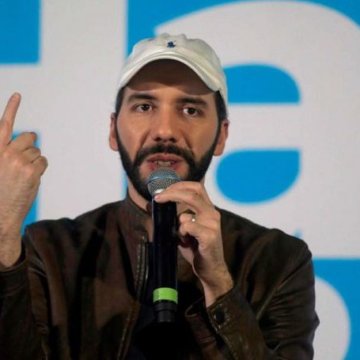- About
- Topics
- Picks
- Audio
- Story
- In-Depth
- Opinion
- News
- Donate
- Signup for our newsletterOur Editors' Best Picks.Send
Read, Debate: Engage.
| located: | El Salvador |
|---|---|
| editor: | Magdalena Rojo |
Nayib Bukele is the first millennial president in Latin America. In February, the 37-year-old Salvadorian was elected in the first round of the presidential elections with 53 percent of the votes, even though he was not running for any of the two most powerful political parties, the Nationalist Republican Alliance (ARENA) or the Farabundo Martí National Liberation Front (FMLN).
Some voices from the opposition say Bukele's presidency is a consequence of a bubble created around him on social media that he uses more than any other president in the history of the country. He is a millennial at the end.
According to various experts, the former businessman and mayor of Nuevo Cuscatlán and San Salvador lacks details in his communication about how to solve the biggest challenges that the country is facing. Since the beginning of June, Bukele is the head of the state that scores as one of the most dangerous in the world due to its high rates of homicides.
The slogan of Bukele's presidential campaign was: “There’s enough money when no one steals.” He was referring to the former president Elías Antonio Saca and other people from his government who were sentenced for corruption last year. Corruption is one of the biggest challenges that Bukele will be facing. An economist César Villalona told BBC that Bukele would bring an economic business group into the government instead of members of rich families—that are part of the ARENA party. To others, the proposals of how to combat corruption in the country can take years to execute. It will also be difficult with the current parliament that will be dominated by the opposition until 2021.
Bukele also proclaims that he wants to bring employment to El Salvador so that people do not have to migrate to the United States. About 38 percent of Salvadorian live in poverty and about one third of the country's population resides abroad, with the majority living in the US.
However, poverty is not the only reason why people take off on the risky journey. Violence is another one.
The new government plan, Plan Cuscatlán, is proposing a change of paradigm in solving the situation with gangs responsible for extortions and violence. Bukele wants to approach the issue as a social problem that is a consequence of poverty and a lack of opportunities. He wants to prevent young people from entering gangs by giving them other options. He also talks about reintegration of former gang members. He already announced on his Twitter that telephone companies will disconnect prisons where the orders for extortions and killings come from. Bukele also wants to prevent the financing of gangs and instead of focusing on rural areas, he wants to focus on solving the situation in the centers of big cities.
The new president, however, said he was not open to enter dialogue with gangs. The BBC consulted various analysts who suggest that the talks are inevitable if the new president wants to reduce homicide rates in his country.
The expectations towards Nayib Bukele are high, as the situation in El Salvador is critical. Unlike tweets, the solutions will not be instant.
